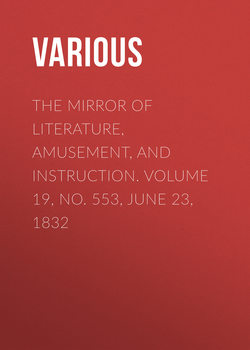Читать книгу The Mirror of Literature, Amusement, and Instruction. Volume 19, No. 553, June 23, 1832 - Various - Страница 2
ANECDOTE GALLERY
ОглавлениеHOBBES AT CHATSWORTH. 6
Of all the personages connected with the local history of Chatsworth, who may have been rendered conspicuous either by their situation or their talents, perhaps no one has a more powerful claim to notice than the once celebrated latin poet and philosopher, Hobbes: his connexion with the Devonshire family began early in life, and Chatsworth, in consequence, became his occasional residence; he was a man originally of a weak constitution, and he is said to have been subject through life to imaginary and unnecessary personal fears, which continually preyed upon and agitated his spirits; yet by a strict and uniform attention to diet and exercise, he lived to the age of 92. He was a very early riser, and as soon as he had quitted his bed he walked or rather ran to the tops of some of the hills about Chatsworth, that he might enjoy a fresher and a purer breeze than circulated through the valley. This practice he continued until he was compelled to relinquish it by the infirmities of age. After breakfast he visited the Earl and the Countess of Devonshire and their children, until about twelve o'clock, when he dined in a private apartment by himself: he then retired to his own room, where ten or twelve pipes, filled with tobacco, were ranged in a row on his table ready to be used in succession: he then commenced his usual afternoon's employment of smoking, thinking, and writing, which he continued for several hours. When thus engaged he was frequently visited by foreigners of distinction, who were attracted to Chatsworth chiefly by the celebrity which Hobbes had acquired amongst the learned and the great. St. Evermond, in one of his letters to Waller, which is dated from Chatsworth, details some interesting particulars of this extraordinary man, whom he found, as he expresses it, "like Jupiter, involved in clouds of his own raising." He says,
"I now write to you from the Earl of Devonshire's, where I have been this fortnight past, paying my devotions to the Genius of Nature. Nothing can be more romantic than this country except the region about Valois, and nothing can equal this place in beauty but the borders of the Lake.
"It was not, however, so much the desire of seeing natural curiosities that drew me hither: there is a certain moral curiosity under this roof which I have long wished to see, and my lord Devonshire had the goodness to indulge me by a very kind invitation: I need not tell you that I mean the great philosopher Mr. Hobbes, so distinguished for the singularity of his sentiments and disposition. I arrived a little before dinner, notwithstanding which the earl told me he believed I was too late to see Mr. Hobbes that day. 'As he does not think like other men,' said his lordship, 'it is his opinion that he should not live like other men; I suppose he dined about two hours ago, and he is now shut up for the rest of the day: your only time to see him is in the morning, but then he walks so fast up those hills that unless you are mounted on one of my ablest hunters you will not keep pace with him.' It was not long before I obtained an audience extraordinary of this literary potentate, whom I found like Jupiter involved in clouds of his own raising. He was entrenched behind a battery of ten or twelve guns, charged with a stinking combustible called tobacco. Two or three of these he had fired off, and replaced them in the same order. A fourth he levelled so mathematically against me, that I was hardly able to maintain my post, though I assumed the character and dignity of ambassador from the republic of letters. 'I am sorry for your republic,' said Hobbes, 'for if they send you to me in that capacity, they either want me or are afraid of me: men have but two motives for their applications—interest and fear; but the latter is in my opinion most predominant.' I told him that my commission extended no farther than to make him their compliments and to enquire after his health. 'If that be all,' said he, 'your republic does nothing more than negotiate by the maxims of other states, that is, by hypocrisy: all men are necessarily in a state of war, but all authors hate each other upon principle: for my part, I am at enmity with the whole corps, from the bishop of Salisbury down to the bell-man: nay, I hate their writings as much as I do themselves: there is nothing so pernicious as reading; it destroys all originality of sentiment. My lord Devonshire has more than ten thousand volumes in his house; I entreated his lordship to lodge me as far as possible from that pestilential corner: I have but one book, and that is Euclid, but I begin to be tired of him; I believe he has done more harm than good; he has set fools a reasoning.' 'There is one thing in Mr. Hobbes's conduct,' said lord Devonshire, 'that I am unable to account for: he is always railing at books, yet always adding to their number.' 'I write, my lord,' answered Hobbes, 'to show the folly of writing. Were all the books in the world on board one vessel, I should feel a greater pleasure than that Lucretius speaks of in seeing the wreck.' 'But should you feel no tenderness for your own productions?' 'I care for nothing,' added he, 'but the Leviathan
6
From Rhodes's "Peak Scenery."
